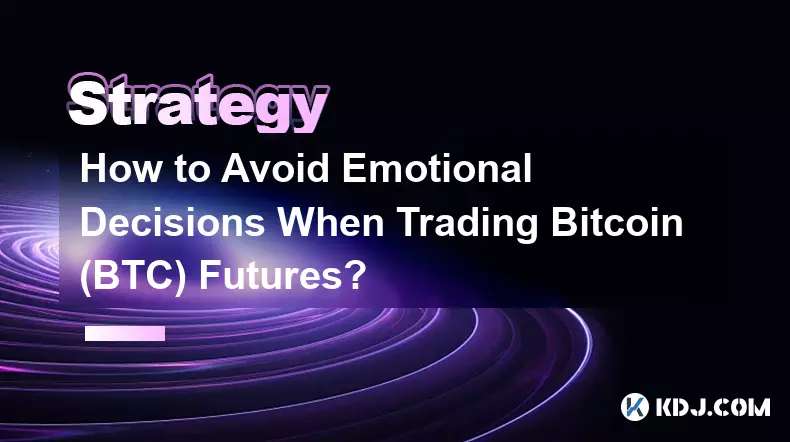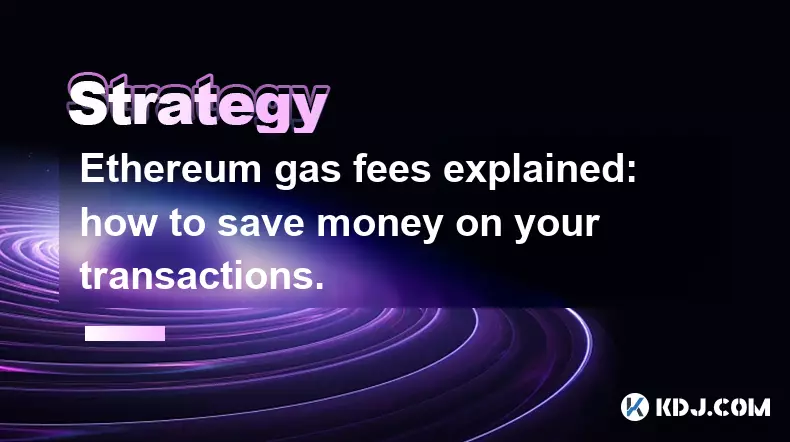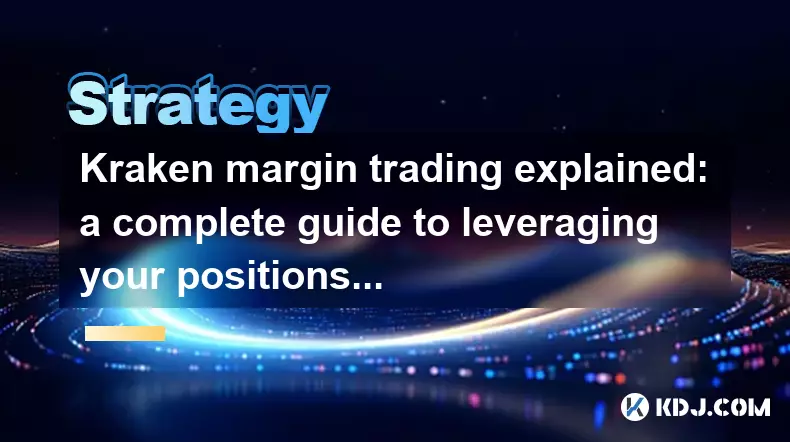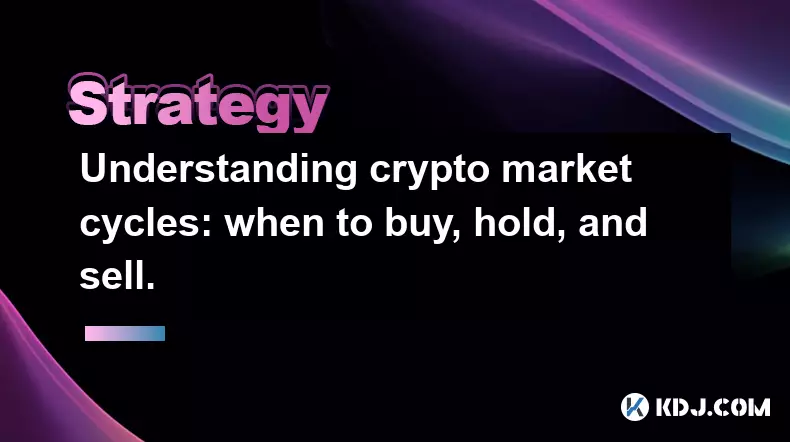-
 bitcoin
bitcoin $107015.826941 USD
-2.18% -
 ethereum
ethereum $3637.352324 USD
-5.18% -
 tether
tether $0.999831 USD
-0.02% -
 xrp
xrp $2.338078 USD
-6.23% -
 bnb
bnb $998.272150 USD
-6.97% -
 solana
solana $167.598257 USD
-10.12% -
 usd-coin
usd-coin $0.999863 USD
0.01% -
 tron
tron $0.282573 USD
-5.09% -
 dogecoin
dogecoin $0.169891 USD
-7.39% -
 cardano
cardano $0.557554 USD
-7.03% -
 hyperliquid
hyperliquid $39.914802 USD
-5.85% -
 chainlink
chainlink $15.414549 USD
-9.97% -
 bitcoin-cash
bitcoin-cash $510.361911 USD
-4.26% -
 ethena-usde
ethena-usde $0.999194 USD
-0.03% -
 stellar
stellar $0.282092 USD
-6.07%
How to Avoid Emotional Decisions When Trading Bitcoin (BTC) Futures?
Understanding the psychology behind Bitcoin futures trading helps traders manage emotions like fear and greed, avoid cognitive biases, and stick to disciplined, rules-based strategies.
Oct 30, 2025 at 08:36 pm

Understanding the Psychology Behind Bitcoin Futures Trading
1. The volatility of Bitcoin futures often triggers emotional responses in traders, especially during sharp price swings. Fear and greed dominate decision-making when large movements occur within minutes. Traders may panic-sell during sudden dips or over-leverage during rapid rallies without proper analysis.
2. Recognizing cognitive biases such as confirmation bias, loss aversion, and anchoring can help mitigate impulsive actions. Many traders only seek information that supports their existing position, ignoring signals that suggest a reversal. This selective thinking leads to poor risk management and missed exit opportunities.
3. The fast-paced nature of crypto derivatives markets amplifies stress levels. Unlike traditional markets with set trading hours, Bitcoin futures operate 24/7, making it difficult for traders to disconnect emotionally. Continuous monitoring often results in overtrading and reactive behavior based on short-term fluctuations.
4. Social influence from online communities and influencers adds another layer of emotional pressure. When popular figures post bullish or bearish takes, retail traders may feel compelled to follow the crowd without verifying the fundamentals or technical setup.
Implementing Structured Trading Rules
1. Define entry and exit points before opening any position. Use technical indicators like moving averages, RSI, and support/resistance levels to establish objective criteria. This removes guesswork and reduces the temptation to act on impulse when emotions run high.
2. Set strict stop-loss and take-profit levels for every trade. These predefined boundaries prevent holding losing positions in hope of recovery or exiting profitable trades too early out of fear. Automated orders ensure execution regardless of emotional state.
3. Limit position size to a fixed percentage of total capital per trade. Overexposure increases psychological pressure and magnifies losses, leading to emotional distress. Consistent sizing promotes discipline and long-term sustainability.
4. Maintain a trading journal to record each decision, including rationale, outcome, and emotional state at the time. Reviewing past entries helps identify patterns of emotional trading and reinforces adherence to strategy.
Building Emotional Resilience Through Routine
1. Establish a pre-market routine that includes reviewing open positions, checking macroeconomic news, and analyzing key chart patterns. A structured start reduces anxiety and fosters a calm mindset before engaging in active trading.
2. Take regular breaks during extended trading sessions. Stepping away from screens allows mental reset and prevents fatigue-induced errors. Even short walks or breathing exercises can significantly improve focus and emotional control.
3. Avoid trading during periods of personal stress or distraction. Emotional stability is crucial when managing leveraged instruments like BTC futures. Trading while emotionally compromised increases the likelihood of irrational decisions.
4. Practice mindfulness techniques such as meditation or journaling to enhance self-awareness. Being conscious of internal emotional shifts enables timely intervention before they influence trading behavior.
5. Never adjust stop-loss orders wider after entering a trade just to avoid a loss. This undermines risk management and feeds into denial-based decision-making.
Frequently Asked Questions
What causes emotional trading in Bitcoin futures?Emotional trading arises from fear of missing out (FOMO), fear of loss, overconfidence after wins, and external market noise. High leverage available in futures contracts intensifies these emotions, as small price moves can lead to significant gains or losses.
How can I stay disciplined during a losing streak?Stick to your trading plan and avoid increasing position sizes to recover losses quickly. Accept that drawdowns are part of trading. Reduce activity if needed and revisit your strategy instead of forcing trades out of frustration.
Should I close all positions during high-volatility events?Not necessarily. Instead, adjust position sizes and tighten risk parameters ahead of major events like Fed announcements or ETF decisions. Having a volatility-adjusted strategy prevents being caught off guard.
Can automated trading help reduce emotional interference?Yes. Algorithmic systems execute trades based on predefined rules without human intervention. While not immune to design flaws, bots eliminate real-time emotional input, promoting consistency in execution.
Disclaimer:info@kdj.com
The information provided is not trading advice. kdj.com does not assume any responsibility for any investments made based on the information provided in this article. Cryptocurrencies are highly volatile and it is highly recommended that you invest with caution after thorough research!
If you believe that the content used on this website infringes your copyright, please contact us immediately (info@kdj.com) and we will delete it promptly.
- Milk Mocha's $HUGS: The Presale Meme Coin Redefining Community and Value
- 2025-11-04 17:50:02
- Dogecoin, Lyno AI, and Growth Potential: A New Era for Crypto?
- 2025-11-04 17:45:01
- DASH Price Surges Amid Aster Listing: Market Confidence Returns?
- 2025-11-04 17:45:14
- Crypto Price Predictions: DeFi Coins to Watch in 2026 – Will MUTM Outshine XRP?
- 2025-11-04 17:50:01
- Rare Coin Mania: The Red Coin Collectors Rush!
- 2025-11-04 17:55:02
- Shiba Inu, Blue Kachina, and a Message: What's the Buzz?
- 2025-11-04 17:55:02
Related knowledge

Ethereum gas fees explained: how to save money on your transactions.
Nov 04,2025 at 04:01pm
Ethereum Gas Fees: Understanding the Basics1. Ethereum operates on a decentralized network where every transaction requires computational power to exe...

Kraken margin trading explained: a complete guide to leveraging your positions.
Nov 04,2025 at 02:19pm
Kraken Margin Trading Overview1. Kraken is one of the most established cryptocurrency exchanges offering margin trading to experienced traders seeking...

NFT flipping for beginners: a step-by-step guide to profitable trading.
Nov 02,2025 at 11:54pm
NFT Flipping Basics: Understanding the Market1. NFT flipping involves purchasing non-fungible tokens at a lower price and reselling them for profit, o...

How to find the next 100x altcoin: a fundamental analysis checklist.
Nov 02,2025 at 09:54pm
Decentralized Exchanges Are Reshaping Trading Dynamics1. Decentralized exchanges (DEXs) have emerged as a powerful alternative to centralized platform...

Understanding crypto market cycles: when to buy, hold, and sell.
Nov 02,2025 at 11:19am
Decoding the Rhythm of Crypto Market Cycles1. The cryptocurrency market operates in recurring phases marked by predictable psychological and financial...

Beginner's guide to crypto staking: earn passive income on your holdings.
Nov 03,2025 at 05:36pm
What Is Crypto Staking?1. Crypto staking involves locking up a certain amount of cryptocurrency in a blockchain network to support operations like tra...

Ethereum gas fees explained: how to save money on your transactions.
Nov 04,2025 at 04:01pm
Ethereum Gas Fees: Understanding the Basics1. Ethereum operates on a decentralized network where every transaction requires computational power to exe...

Kraken margin trading explained: a complete guide to leveraging your positions.
Nov 04,2025 at 02:19pm
Kraken Margin Trading Overview1. Kraken is one of the most established cryptocurrency exchanges offering margin trading to experienced traders seeking...

NFT flipping for beginners: a step-by-step guide to profitable trading.
Nov 02,2025 at 11:54pm
NFT Flipping Basics: Understanding the Market1. NFT flipping involves purchasing non-fungible tokens at a lower price and reselling them for profit, o...

How to find the next 100x altcoin: a fundamental analysis checklist.
Nov 02,2025 at 09:54pm
Decentralized Exchanges Are Reshaping Trading Dynamics1. Decentralized exchanges (DEXs) have emerged as a powerful alternative to centralized platform...

Understanding crypto market cycles: when to buy, hold, and sell.
Nov 02,2025 at 11:19am
Decoding the Rhythm of Crypto Market Cycles1. The cryptocurrency market operates in recurring phases marked by predictable psychological and financial...

Beginner's guide to crypto staking: earn passive income on your holdings.
Nov 03,2025 at 05:36pm
What Is Crypto Staking?1. Crypto staking involves locking up a certain amount of cryptocurrency in a blockchain network to support operations like tra...
See all articles










































































